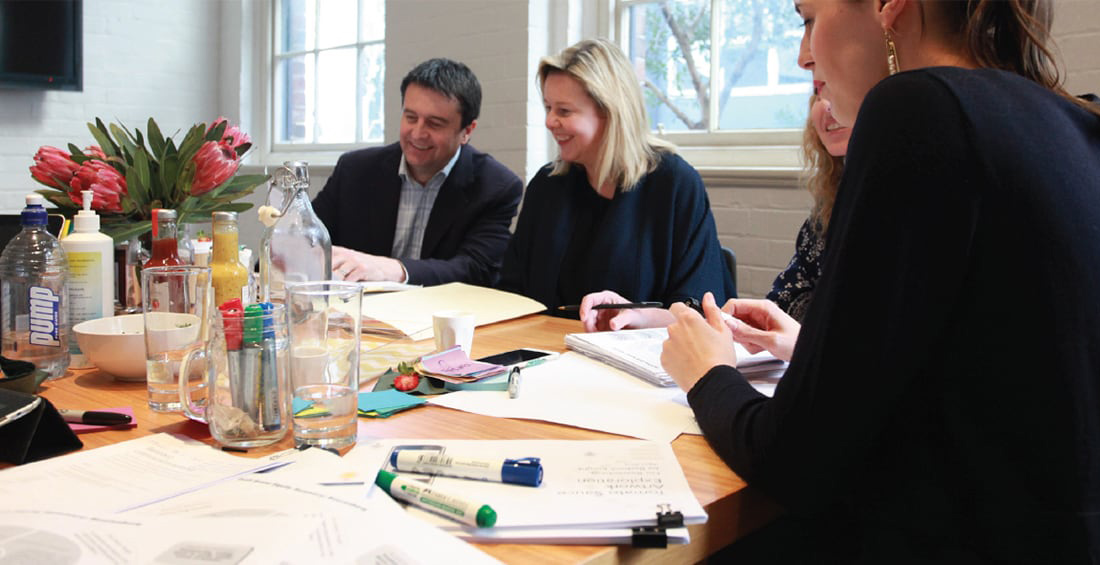The power and pitfalls of the family business brand
We recently welcomed 10 family businesses to join us at our first exclusive, free roundtable event ‘The Power and Pitfalls of the Family Business Brand.’ We were joined by engineering, FMCG, and professional services companies who shared their stories, advice, and anecdotes.
Although we can’t share all of the details of the discussion (that was just for those in the room!) there were some common threads of advice that ran throughout. So, if you’re a family business that wants to make the most of your brand potential, follow the advice below.
CREATE YOUR BRAND STRATEGY
According to many in the room, deciding on the brand strategy is one of the hardest parts of running a family business. But having a clear strategy is invaluable when it comes to ensuring consistency in messaging, look and feel, and quality. It is also invaluable for making wider business decisions as it provides clarity on what is important to your business and your customer. A brand strategy defines your company’s purpose and role in the world, who your target audience is, what makes you unique, your values and personality and most importantly both the emotional and rational benefit of your brand.
“We’ve completed our brand strategy and it’s become our bible. We refer to it constantly as a way to sense check decisions for both the brand and the business.”
“Deciding on a company strategy is the trickiest part because so many opinions can come into it. That’s what slows family businesses down.”
“Having a clear strategy helps to remove subjectivity.”
“You must always, always think about your audience first.”
“Brand consistency is so important. For a company with one brand, one location, one focus, it is much easier than those with multiple – but it can be done.”
“I want to be obsessed with branding, marketing and advertising as I now understand how important it is for business success.”
TELL YOUR STORY
The big ticket for any family business is your story, your history, and your heritage, Whether you’re one year old or 100 years old, people love to hear tales of the underdog. And for many family businesses, this is exactly how they began. It’s important to remember that people buy into people, and defining your story and telling it in an authentic way ensures you maximise this emotional response from your customers. There are so many faceless brands out there, and family businesses shouldn’t be one of them.
“It’s all about the story. Even if you diversify, you have the trunk of the truth that you can then make stronger.”
“We’re conscious to tell our story in a way that is authentic, honest to our values but doesn’t make us sound too full of ourselves. It can be a fine line, but powerful if you get it right.”
“As a nation, we suffer from the tall poppy syndrome, and the story of a successful family business is the rise against this.”
“You must tell your story with humility.”
“If you don’t have a good presence online it really says a lot. It says that you can’t be bothered. Embrace the opportunity that your website gives you to really tell your story.”
If you’d like the PDF version of this blog – complete with additional advice and further reading – please email us or call us on +61 2 9360 0099.
DEFINE YOUR VALUES
A topic that participants came back to time and again was company values, and the power that well-defined and embedded values can have on employee engagement and company growth. They enable faster decision making by having a moral checklist to refer to and create a cohesive working environment.
“You have to choose your company values, maintain them, and when you bring new people in you must train them on these values.”
“Our family business is 96 years old and our family values still form the basis of our decision making. We’ve had new team members join that have tried to shake this and then realise it’s inherent to who we are, and the success we have achieved.”
“I’ve asked my other family members about our values and no-one knows. But I know it’s such an important thing for us to have. It’s integral.”
“People don’t buy what you do, they buy why you do it. Defining your why is difficult but forms the foundation for the rest of your brand.”
“The most powerful part of our brain doesn’t know language, it just knows emotions.”
INCLUDE YOUR EMPLOYEES
Being a family business has plenty of appeal to potential employees, but it can also have its challenges. The dynamics can often be very different to a corporate entity and ensuring employees feel involved, and ‘part of it’ is a must for commercial and brand success. Employees aren’t just joining a business, they’re joining a family.
“My father has really strong views and is very much the face of the business. We need to harness his energy but also make him more approachable to staff.”
“With family businesses, it’s really important to be transparent with figures and to share success stories. Be inclusive to those outside the immediate circle.”
“You need to treat people like people and have trust that they too have the best intentions for the business.”
LOOK OUTSIDE THE BUSINESS
Seeking advice, learning, and guidance from those outside of your business is important, both operationally and from a branding perspective. Roundtable participants shared the publications and organisations that they value the most and anecdotes of time spent away from the family business to broaden their horizons.
“People need real world experience outside of the family. I went to work for David Jones and to this day, that experience shapes the level of customer service that I expect myself and my employees to give our clients.”
“Young Presidents Organisation (YPO), Women’s Presidents Organisation (WPO), YPO Next Generation, Family Business Association, Harvard Business Review, these are all worth exploring.”
“We currently don’t require family members to work elsewhere but I think it would be hugely helpful. Otherwise, you’re part of a very small world and it’s a powerful experience to get out there first.”
“We have a non-family board which has input on all major decisions.”
FUTURE PROOFING
Although the event was primarily about branding, the conversation inevitably drifted to operations and the challenges of running a family organisation. Planning for the future and managing expectations was high on the agenda for everyone involved.
“Public companies have a short term view, family businesses have a long term view.”
“Don’t put your head in the sand. Bad things can happen and you need to know what will happen if someone passes away, or if a family member no longer wants to be involved. How will this be handled and how will it impact the business and the brand?”
“We’re all very different and this can cause friction sometimes, but the love is always there and no one would ever leave anyone high and dry. That’s what makes family businesses so different.”
MOVE WITH THE TIMES
Juggling the heritage of a family business, dealing with family dynamics, and the challenge of not always having experience from outside the company means that some family businesses can be slow to adopt new trends or technologies. While the emphasis on product or service should never be compromised, many recognised the need to react quickly as consumer’s expectations for ‘something new’ continues to rise.
“Really identify your customer’s pain point. Your business should solve that, and your brand should address it.”
“Family businesses can sometimes be slow to move but it’s important to adapt to new trends. You can’t respond to the whims of a few, or you’ll kill your business. But you must adapt.”
“The best thing to invest in at the moment is saving people time. The next generation businesses are the ones that can do that. People are impatient!”
“Explore new business ventures for the brand based on family member’s own strengths.”
“The brand gets the foot in the door – but the quality of the product gets you completely in. Ensure that they are in alignment.”
We’d like to say a big thank you to everyone that joined us at our first ever roundtable event. We’ll be making these a regular fixture in the Tiny Hunter calendar, and if you’d like to be involved in our next event please don’t be shy in letting us know. Either email us here or call us on +61 2 9360 0099.









